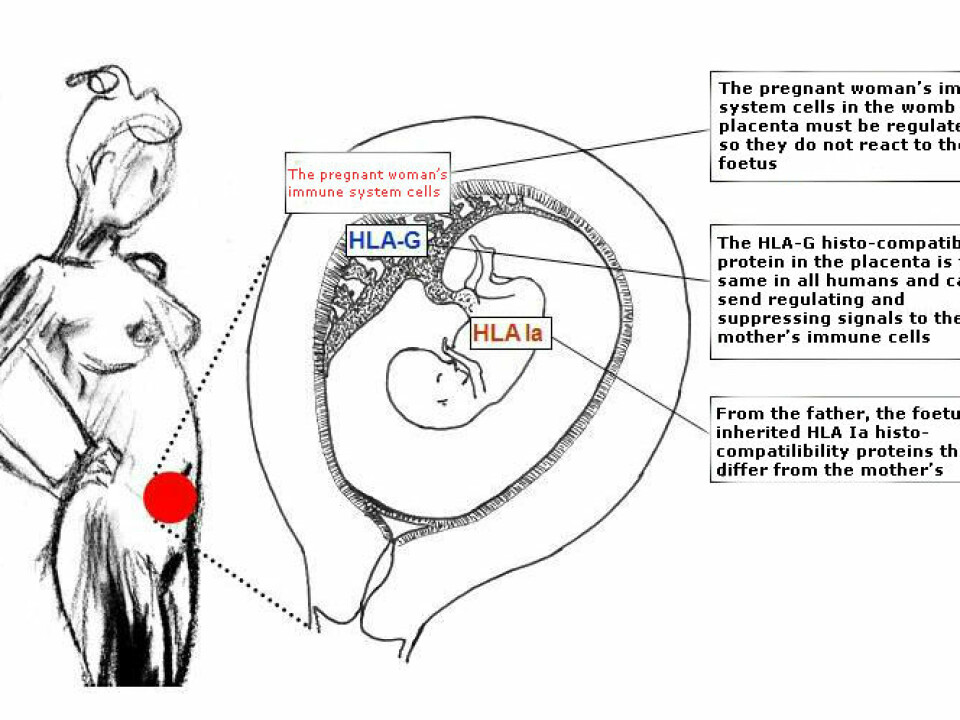
Frequent sex can prevent pregnancy complications
Having sex more often can reduce the risk of developing a serious medical condition called pre-eclampsia during pregnancy. Sperm contains a special protein that increases the chances for a successful pregnancy.
Between 3 and 5 percent of pregnant women develop pre-eclampsia, a medical condition that is the main cause of complications for both mother and baby during and after pregnancy.
Symptoms include increased blood pressure and protein in the urine in the second half of the pregnancy. In the most serious cases the pregnant woman can develop violent seizures that in rare instances can be fatal.
New Danish research shows that a special protein, which has now been found in the man’s sperm can have a positive impact on the risk of developing the serious condition. The protein, HLA-G, can regulate the body’s immune system.
Sex – and possibly oral sex – keeps the risk low
Much indicates that a couple’s sexual activity together affects the risk of the woman developing pre-eclampsia during a later pregnancy.

Several studies have shown that if they use condoms or have only known each other for a short time before pregnancy, there is an increased risk that the woman will develop pre-eclampsia.
There is a greater occurrence of pre-eclampsia among women who are pregnant for the first time, and they often experience more intense symptoms than women who have been pregnant before.
There is also a more controversial study that has found a connection between oral sex and a reduced risk of developing pre-eclampsia.
Immunological tolerance vital during pregnancy
Overall, the majority of studies that have been published show these tendencies and the observations are supported by results from other scientific studies that show that frequent contact with sperm before a pregnancy can affect the immune system in a way that is positive for the pregnancy.
The explanation for this is found in the interaction between the woman’s immune system and the tissue of the foetus – an immunological tolerance is developed that prevents the immune system reacting against the foetus. If this immunological tolerance fails, according to one theory, pre-eclampsia can result.
Lack of signals suppressing the immune system
Research carried out at the Centre for Immune Regulation and Reproductive Immunology (CIRRI), at the Department of Biochemistry at Roskilde Hospital in Denmark indicates that one factor in this vital effect on the woman’s immune system before and during pregnancy is a special HLA-G molecule (see factbox).
Several studies have shown that HLA-G is found in smaller amounts in the placenta and blood of pregnant women with severe pre-eclampsia compared with normal pregnancies.
CIRRI’s researchers theorise that the symptoms of pre-eclampsia arise because no optimal signals to suppress the immune system, such as HLA-G molecules, are sent to the woman’s immune system and particularly to the placenta early in the pregnancy – and perhaps even before the pregnancy develops.
HLA-G protein in sperm important for pregnancy
Research headed by CIRRI Chief Physician and Associate Professor Thomas Hviid, Margit Larsen, PhD student, and Snezana Djurisic, a PhD student at Copenhagen University Hospital (Roskilde) has now shown that HLA-G is also found in male sperm.
Other, ongoing research also shows that the concentration of HLA-G molecules in sperm samples from different men varies greatly and that there is a clear correlation between different genetic variants of HLA-G and the amount of HLA-G protein in the sperm and blood. This may be important to both how easily a woman gets pregnant and how the pregnancy develops.
Early diagnosis of pre-eclampsia important
There is much to indicate that immuno-suppressive factors from the woman, the man and the foetus are vital for ensuring immunological tolerance between the mother and the foetus. According to the CIRRI group’s theory, regulating the immune system will lower the risk of developing pre-eclampsia.
The CIRRI research aims at improving and targeting the treatment of pre-eclampsia – currently, only the symptoms can be treated with medicine to reduce blood pressure or by bringing childbirth forward.
Further research will determine whether measuring the level of HLA-G in an ordinary blood sample from pregnant women early in their pregnancies can indicate which women have a risk of developing pre-eclampsia later in the pregnancy, so they can be given more attention.
Translated by: Michael de Laine
Scientific links
- HLA-G in human reproduction: aspects of genetics, function and pregnancy complications
- Human Leukocyte Antigen-G in the male reproductive system and in seminal plasma
- Correlation between oral sex and a low incidence of preeclampsia: a role for soluble HLA in seminal fluid?
- Duration of sexual relationship and its effect on preeclampsia and small for gestational age perinatal outcome.










